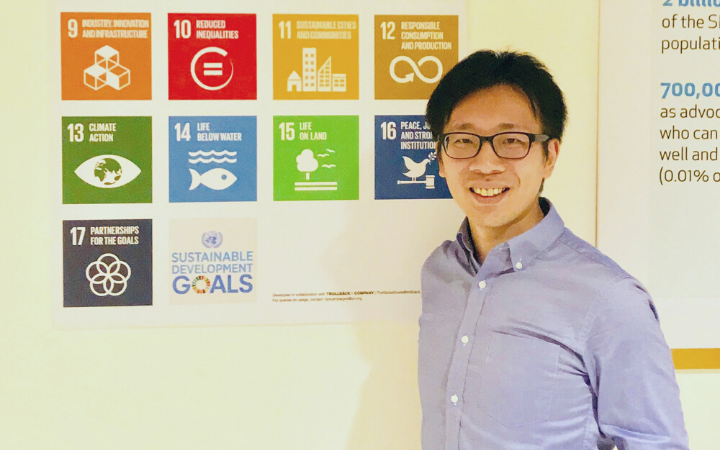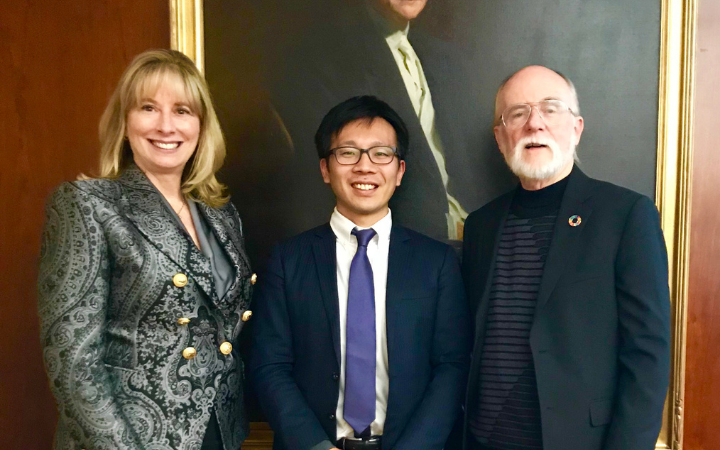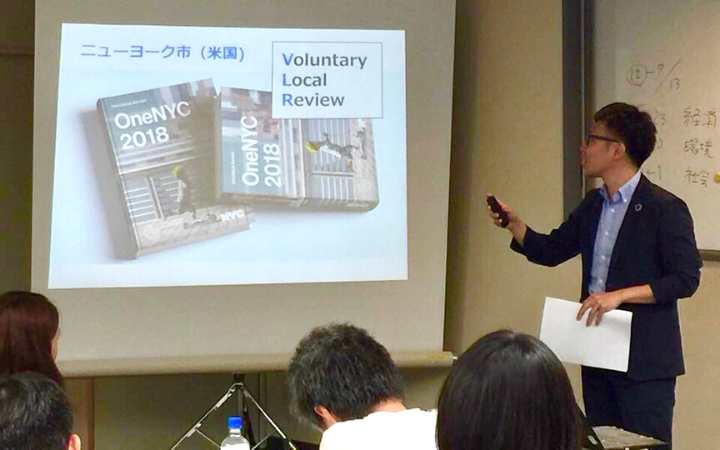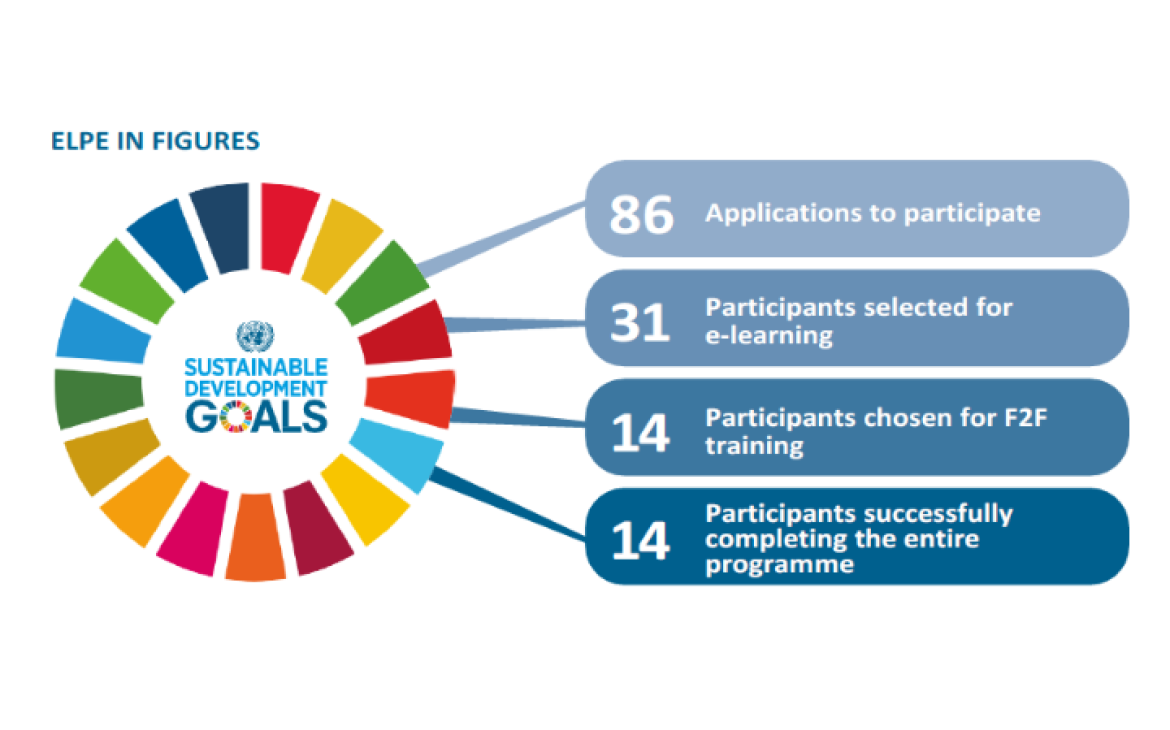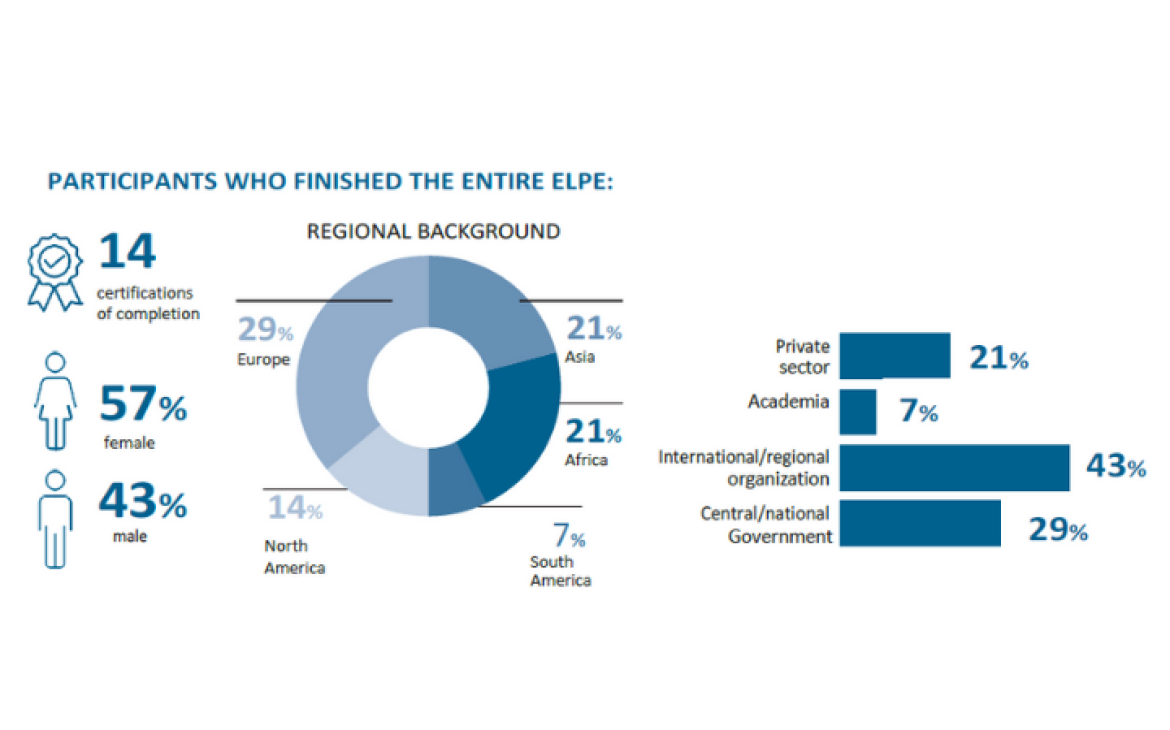Background
The development of individual, institutional and organizational capacities is a requirement to produce useful and rigorous evaluations to ensure accountability and learning in the framework of the 2030 Agenda for Sustainable Development. Following the landmark General Assembly resolution 69/237 which calls for building national evaluation capacities, entities of the UN development system and beyond have been working to strengthen evaluation capacities in accordance with national policies and priorities. As a result, the United Nations Institute for Training and Research (UNITAR), in partnership with the Claremont Evaluation Center – New York (CEC-NY), implemented the first edition of the Executive Leadership Programme in Evaluation and the Sustainable Development Goals (ELPE) from November 2017 to March 2018.
The ELPE is a certificate training programme designed to build evaluation capacity to support the follow up and review processes of the 2030 Agenda. The ELPE targeted established and aspiring leaders from government, nongovernmental and international organizations such as the UN as well as the private sector.
The programme used a blended learning approach through three components:
- E-Learning course on the 2030 Agenda, legitimized by 22 United Nations entities which is supported by two online moderators with experience in evaluation and the SDGs.
- Face-to-face workshop managed by different experts in leadership and evaluation, adapted to the 2030 Agenda context, and held in New York City over five days.
- Individualized follow-up project with faculty mentoring to ensure the application of knowledge and skills after the programme.
The implementation of the first edition was a success with 31 participants completing the e-Learning course and 14 participants taking part in the face-to-face courses and follow-up one-on-one coaching between faculty and mentees. The feedback received was positive.
Impact Story - Cosmo Takagi
Cosmo Takagi
PhD Student
Meiji University Graduate School of Global Governance, Japan
Cosmo Takagi may be a young professional, but he has a determination to change the world that could rival the most senior evaluator. While working as a public servant for five and half years in Japan, Cosmo realized that the local government policies were not on par
with the global environment for evaluation. He felt the need to make a change in his local government, but first he decided to participate in the Executive Leadership Programme in Evaluation and the SDGs during its first session in New York.
“[I wanted to participate in this programme] because in Japan, especially in the local government, the evaluation has not been working. We do not scale the impact of evaluation or include the policy based on the evaluation. We check the efficiency and effectiveness from an audit perspective.”
Cosmo felt that the local Japanese government is not using the evaluation of SDGs to its full potential. “I noticed this problem, and I decided to learn about the SDGs and how to use the SDGs in the local government policy from the perspective of evaluation.”
He emphasized that the methods and approaches taught in the ELPE are essential to improve evaluation in Japan. From the online training, Cosmo learned the basic knowledge on the SDGs, while in the face-to-face training he learned more about practical approaches. The lecture by Michael Quinn Patton on the Leadership for transformative change in the SDGs era particularly influenced Cosmo. He stated,
We need to recognize that leaders are required for evaluative thinking.
While Cosmo did have exposure to several of the evaluation approaches prior to the ELPE, he felt that his knowledge and ability to apply the methods significantly expanded since his participation in the programme. But not only did the lectures and online courses influence him, Cosmo also attributed his most significant change in his professional life to the conversations with the fellow participants. The programme allowed several opportunities for the participants to share their own experiences and best practices for evaluation in their own country.
During the course, we talked often amongst the other participants of the ELPE. Before the ELPE, I didn’t think about SDG evaluation. Gradually, with my colleagues in the class we exchanged our knowledge and opinions. It was very effective to talk with the other colleagues from all over [the world]. We shared knowledge, and I was inspired, so I decided to start the SDG evaluation in Japan. They are also working on the SDG evaluation in their [respective] countries.
The follow-up mentorship with Deborah Rugg also made a significant change to the development of his project and his career choices. Cosmo felt “inspired by her work” such as when she addressed the UN resolution of the SDGs in 2015 as the UNEG chair.
Not even a year after the ELPE has passed, yet Cosmo has already made a few accomplishments towards his goal to improve evaluation for the SDGs in Japan. Since the ELPE, Cosmo has organized several workshops on the SDGs with staff from the local government as well as workers in Non-Profit Organizations and seminars with 30 participants each for senior level government and students. Cosmo has also established an NGO, called SDGs- SWY, to promote the action for achieving the SDGs by younger generations. With his fellow NGO volunteers, they created material on the Japanese local government’s initiatives towards the SDGs and distributed it at the High Level Political Forum in July 2018. He also wrote a two-page article titled “SDGs brings opportunities to the local governments” in the International Development Journal, one of the most famous magazines among the development professionals in Japan, to spread public awareness on the 2030 Agenda as well as published seven articles on the same subject for a New York-based newspaper targeting the Japanese community, which distributes 20,000 copies each issue.
When asked where he would be today had he not participated in the ELPE, Cosmo stated “Maybe I would not have started this project but would have continued to work as a public servant in Japan. I would not have come to Geneva or New York City or even started the PhD.”
“In Japan, a public servant has a tenure. It is a stable life. But I decided to challenge myself with this adventure because of the ELPE. It was a life-changing event that has a big meaning in my life. My PhD is in global governance, which I decided to do after I graduated from the Master course, but maybe if I didn’t participate in the ELPE I would not have done the PhD because it requires a lot of time and energy. The ELPE was the push to quit my job and start the PhD. My passion to take part in the ELPE was realized by the chance to participate in the Tobitate! (Leap for Tomorrow) Young Ambassador Program, a Japanese public-private partnership scholarship.”
The biggest project Cosmo is planning has yet to come. After speaking to the Dean of his university about his story and experience in the ELPE, Cosmo is working to organize and mobilize the budget to invite his ELPE mentor, an expert on evaluation and the SDGs, to give a lecture to university students as well as hold a seminar with professionals in local government and civil society. Through these actions, he is seriously trying to root the evaluation culture in Japan.
Thanks to the discussions with fellow colleagues, experts on evaluation and his mentor, Cosmo’s experience at the ELPE fostered an agent of change determined to tackle the challenges of evaluation for the SDGs in his home country and abroad.
Conclusion
The 2030 Agenda for Sustainable Development is an unprecedented global endeavor that requires transformative leadership and a bold new approach. The Agenda recognizes the critical role of evaluation in informing global and national leaders of the best way to achieve the 17 SDGs, and will require efforts to further strengthen evaluation practices, in developing and developed countries alike.
The first session of the ELPE in winter 2018 not only taught the participants the fundamentals of the 2030 Agenda and the SDGs but also trained them on evaluation methods to follow-up and review the SDG processes.
By using an innovative approach to combine face-to-face, e-learning and a follow-up mentorship, the ELPE provided the participants an environment to collaborate and learn from fellow colleagues as well as experts in the field of evaluation. Like many of his colleagues, Cosmo left the programme feeling inspired and motivated to become an agent of change to develop the national evaluation capacity in their home country.


